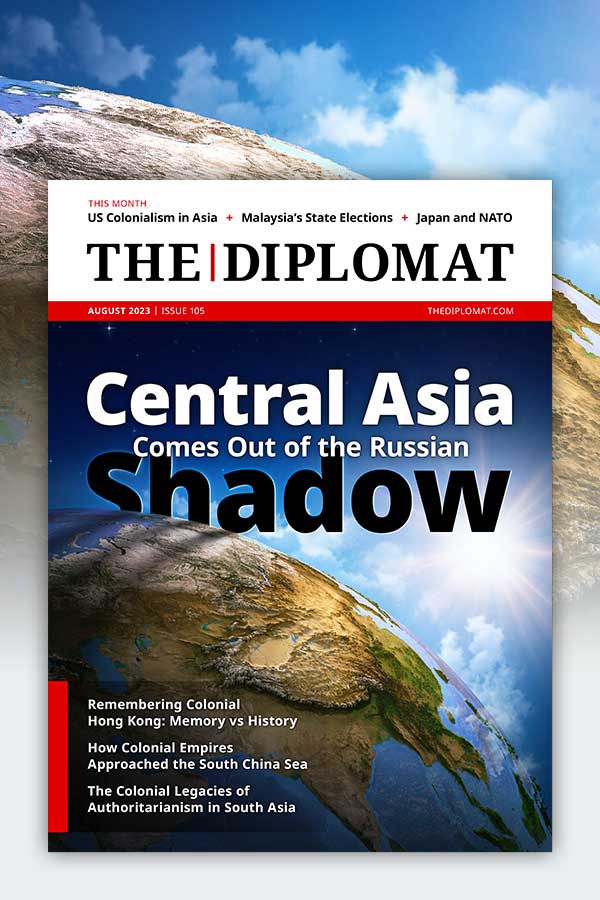| Welcome to the latest issue of Diplomat Brief. This week our top story explores how Tajikistan uses fear to silence human rights activists – at home and abroad. We also have an interview with a women’s right advocate based in Afghanistan about the reality of life under Taliban rule. |
| Story of the week | ![[object Object]](https://thediplomat.com/diplomat-brief/2023/vol33/images/feature.jpg) | Society The Tyranny of Fear in TajikistanWhat Happened: In July, a group of U.N. experts issued a statement urging the government of Tajikistan to release eight imprisoned human rights defenders. Mary Lawlor, the U.N. special rapporteur on the situation of human rights defenders, told The Diplomat that it took ages to get the press release out – in large part because of fear and hesitation among the human rights defenders whose cases were mentioned, and those whose cases were ultimately not. “There were others who said they didn’t want any publicity or their names [printed] because they feared reprisals against them or their family members,” Lawlor said. Our Focus: “Fear is central to the government’s grip on power in Tajikistan,” Edward Lemon, president of the Oxus Society for Central Asian Affairs and a research assistant professor with the Bush School, Texas A&M, told The Diplomat. That fear even reaches to the Tajik diaspora. Bakhtiyor Safarov, the founder of Central Asia Consulting and a human rights defender, told The Diplomat that activists abroad fear for “safety of their relatives, who could face dire consequences such as death, torture, rape, false accusations of extremism or terrorism, confiscation of their wealth, and social exclusion.” Safarov’s own relatives faced so much harassment that they no longer speak to him; he calls this punishment-by-proxy “sociological warfare” undertaken by the Tajik government. What Comes Next: While the U.N. experts’ statement, and analysts interviewed for this story, paint a grim picture, there is a ray of hope: It seems that the Tajik government does respond to sustained pressure. “There have been numerous cases where a combination of public and private pressure via media, social media, and diplomatic channels has worked in securing the release of political prisoners or introduction of new policies,” Lemon said. That puts the onus on governments that purport to care about human rights – like the U.S. and the EU – to back up their talk with targeted actions, including sanctions. Read this story |
| Behind the News | INTERVIEW MaryamMaryam (a pseudonym), a woman’s right advocate based in Afghanistan, on the impact of the Taliban takeover: “In the last 20 years Afghan and international organizations had worked hard for human rights and women’s rights in the extremist and conservative society of Afghanistan. In a world where we study and work to go forward and develop, the Taliban successfully were able to send the country backward to their last period of rule.” Read the interview |
| This Week in Asia | Northeast Asia Japan-South Korea-U.S. Trilateral SummitOn Friday, U.S. President Joe Biden will host Japanese Prime Minister Kishida Fumio and South Korean President Yoon Suk-yeol at Camp David for a trilateral summit – the first such dedicated summit (rather than one arranged on the sidelines of a larger gathering). It’s the culmination of several trends: growing concern in all three countries about the rise of China, increasing threats from North Korea, and new administrations in South Korea and Japan more amenable to working together. Now the rubber meets the road: How far can the summit go in institutionalizing trilateral cooperation, especially given the South Korean public is lukewarm toward the idea? Find out more | South Asia Maldives’ Presidential Slate Is SetMaldives’ presidential election on September 9 will see a record eight candidates for voters to choose from. While the number of candidates in this election marks a significant milestone for the country’s young and tumultuous democracy, it also exposes a fragmented political landscape. President Ibrahim Mohamed Solih’s re-election bid will pit him against several erstwhile allies who split off to form their own parties, most notably former President Mohamed Nasheed’s Democrats. Find out more | Southeast Asia Malaysian State Elections See Conservative GainsOn August 12, Malaysians in six of the country’s 13 states went to the polls to elect new state assemblies, just nine months after last year’s divisive general election. The elections saw Prime Minister Anwar Ibrahim’s capacious Pakatan Harapan (PH)-led coalition hold onto power in three states, with the opposition Perikatan Nasional (PN) coalition maintaining power in the other three. While Anwar’s government has avoided an immediate political crisis, the PN made notable gains in PH-held states by pushing an exclusionary, conservative form of Malay nationalism. The growing polarization of Malaysian society along racial and religious lines suggests longer-term challenges for Anwar’s “unity” government, as the country moves toward its next general election in 2027. Find out more | Central Asia Turkmenistan Miffed Over Russia's Gas Union AspirationsWhat compelled a Turkmen official to push back on admittedly vague comments from a Russian foreign ministry official this week? Turkmengas Deputy Chairman Myrad Archaev, in an interview with state media, questioned what a Russian official meant when he said that “other states” were interested in Moscow’s planned “gas union” with Kazakhstan and Uzbekistan. Reading between the lines, it seems Ashgabat has taken umbridge over Russia’s moves to pump gas into Central Asia. Find out more |
| Visualizing APAC |  | A morning drill at the military headquarters of the Chin National Front, one of many groups actively fighting Myanmar’s military junta. See the full picture |
| Word of the Week | Economy 国进民退Guó jìn mín tuì, Mandarin for “the state advances while the private retreats,” referring to the expansion of state-owned enterprises while the private sector shrinks. Find out more |
|  |

![[object Object]](https://thediplomat.com/diplomat-brief/2023/vol33/images/feature.jpg)

